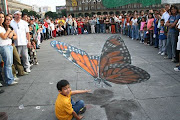
NOW I UNDERSTAND WHY THEY HATE US: How a middle-class white guy came to accept the evil embedded in American political and military might.
I had never heard of David Hilfiker until this week. This remarkable essay is cross-posted at Alternet.com where I was so moved upon reading it that I feel compelled to do whatever I can to help spread his story and analysis.
Though we are obviously very different people in many ways, I can relate to Hilfiker's experience and conclusions. I'm betting that others who may have their own differences with him may find some clarification of their own troubled feelings about what the militarization of America has done to us.
Early in his article Hilfiker describes how he grew up in the 1950s which would make us about ten years apart in age. Like I suspect most Americans who came of age during that post-war era he was instilled with a sense of pride in his country as savior of the world and exemplar of all that is good about civilization. By the 1960s and early 70s of course, the direction in which our leadership had taken us was already eroding the truth in any basis of such a claim while the grandiose self-image imprinted on our collective consciousness was defiantly enforced and guarded.
Hilfiker articulates a viewpoint that verifies one of the major differences between his contemporaries and many of us coming of age in the 60s and 70s. Rather than awakening to a world of exuberance over conquering an enemy of the world our experience was defined by mass confusion, at best, owing to the contradictions between that guarded, high-minded image and reality.
I, for one, have never understood how any impressionable young American could survive into adulthood unaffected by disillusion having lived through the tumultuous era of the civil rights and anti-Vietnam War uprisings. The struggles that were waged then happened right in our living room TV sets if not in our neighborhoods and we absorbed images of the bloody executions of one president, a number of the greatest social leaders of our time along with the suppression and countless murders of activists who may as well been any of us.
Still, so many of us continued to buy into the outmoded image indelibly imprinted on our collective consciousness as a nearly infallible good and moral people despite the horrible shenanigans our government has been up to since then - that continually contradict that hardened image.
Only now, after a half a century or so of denial and exploitation of that denial, the reality behind the image impressed on all of us has perhaps begun to bring us to a humbling position where denial is no longer a reasonable - or even sane - option.
Hilfiker describes how he opted out of involving himself consciously in the events of the 1960s and 70s that were formative years for many of us. I suspect that this is how many of us justify our recent awakening to the ills inherent in our system: by opting out, if only in our minds for those of us who lived through it.
The last two decades of the Twentieth Century saw much less overt trouble than the two decades before. But this does not mean that the ills of that time were resolved. It does, perhaps, explain why Americans who were born or came of age during the 80s and 90s were instilled with an attitude more like those of Hilfiker's era. It was another age of prosperity and Reagan-inspired egotism all built on a false, manufactured image.
For the one millionth time, I will repeat what has been said by everyone alive: 9/11 changed everything. Unfortunately, with George W. Bush at the start of his reign of error, the change it brought until recently has been wrong-headed in the same ways that it was in the fifties: notably with the exploitation of the moment for purposes of those holding all the power.
After eight years of the disastrous Bush regime, however, maybe we are lucky this time since so many of us from all possible coming-of-age eras realize that we are all in the same boat.








No comments:
Post a Comment